6 Jun 2017 | Focolare Worldwide
On May 31, 2017, the University of Tubingen, Germany, conferred an honorary doctorate to the Ecumenical Patriarch of Constantinople, Bartholomew I. The degree honours his long years of work in promoting understanding between the Orthodox Church and the Protestant Churches; his efforts for the protection of the Creation; for Europe and for dialogue among religions. The University is one of the oldest in Germany, founded in 1477 and stands among the most internationally reputable centres of study for students of Medicine, the Natural Sciences, Human Sciences. It currently serves some 28,500 students.
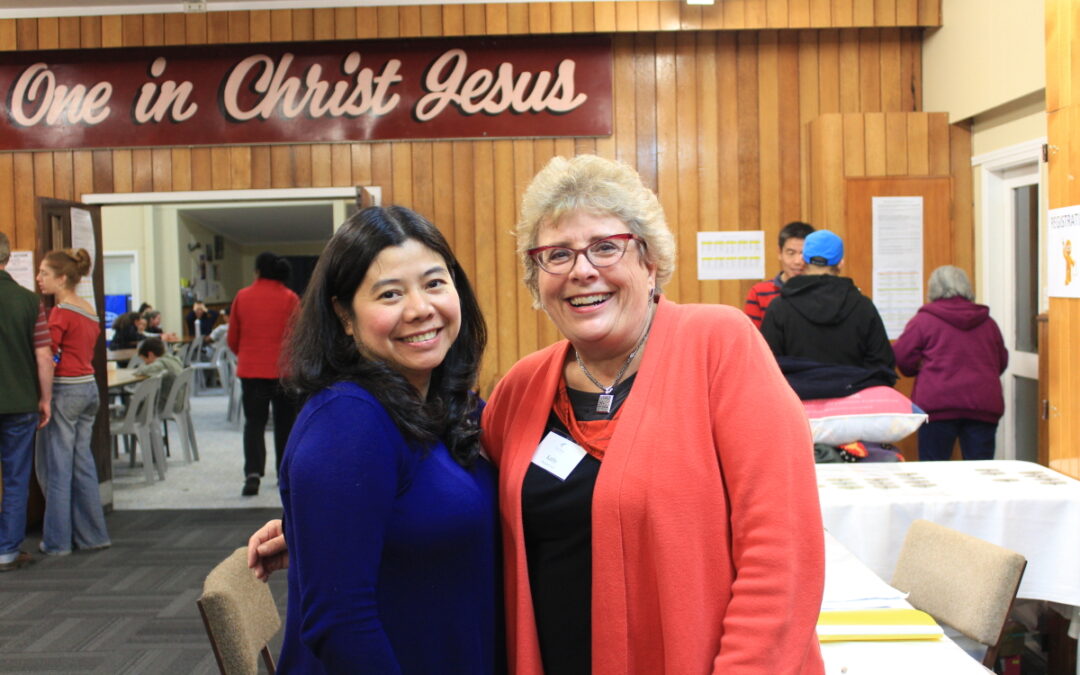
31 May 2017 | Focolare Worldwide
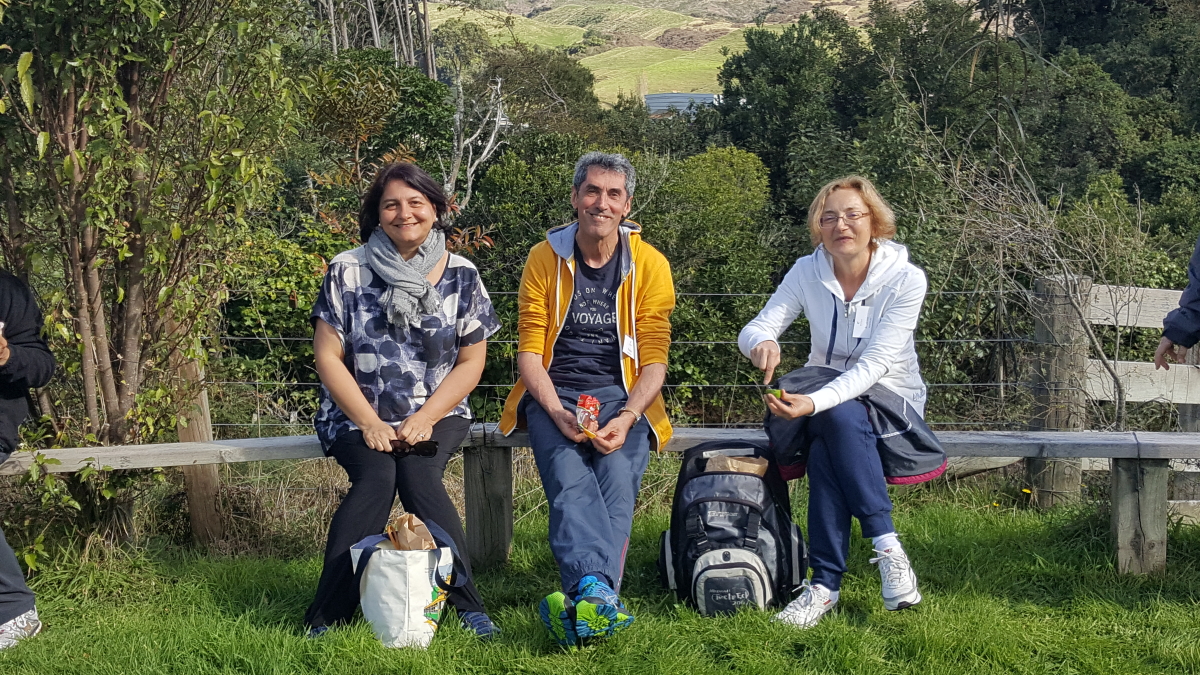 Lake Rotorua is the second biggest lake of the North Island of New Zealand, in the southern Pacific Ocean. Formed from the crater of a big volcano, active up to 240 thousand years ago, today it is a splendid canoe and kayak training ground. A tourist destination since the 19th century, here, as everywhere in the area, a strong smell of sulphur recalls the intense thermal activity which pushes boiling water out of the subsoil, forming pools of hot mud of the most incredible colours from apple green to yellow, cobalt lakes and a myriad of fumaroles. Nearby, the Lady Knox geyser erupts once a day venting out sprays of water and steam 20 metres high.
Lake Rotorua is the second biggest lake of the North Island of New Zealand, in the southern Pacific Ocean. Formed from the crater of a big volcano, active up to 240 thousand years ago, today it is a splendid canoe and kayak training ground. A tourist destination since the 19th century, here, as everywhere in the area, a strong smell of sulphur recalls the intense thermal activity which pushes boiling water out of the subsoil, forming pools of hot mud of the most incredible colours from apple green to yellow, cobalt lakes and a myriad of fumaroles. Nearby, the Lady Knox geyser erupts once a day venting out sprays of water and steam 20 metres high. 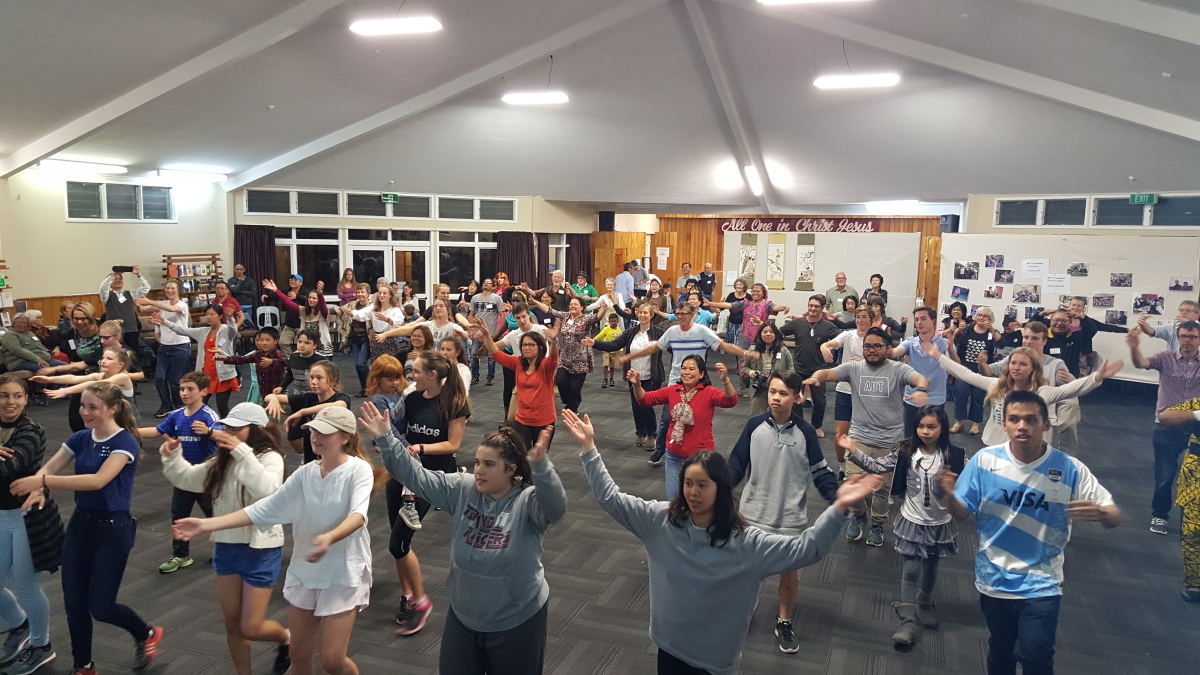 The same bubbly warmth was seen in the 170 participants of the Mariapolis hosted from 26 to 29 April 2017 in a camp situated right on the banks of the lake. Also families from the Philippines, India and Korea participated, including more than 50 teenagers and children, and some Italian visitors comprising of two married couples, Roberta & Stefano, and Beatrice & Franco. They wrote: “We departed from Sydney and after a flight of about four hours, we reached Auckland where we were joined by Yob and Bruno from Melbourne. After a journey of about four hours by car, we arrived in Rotorua. We spent three days there and we felt so enriched by the personal relationships created among all the families.
The same bubbly warmth was seen in the 170 participants of the Mariapolis hosted from 26 to 29 April 2017 in a camp situated right on the banks of the lake. Also families from the Philippines, India and Korea participated, including more than 50 teenagers and children, and some Italian visitors comprising of two married couples, Roberta & Stefano, and Beatrice & Franco. They wrote: “We departed from Sydney and after a flight of about four hours, we reached Auckland where we were joined by Yob and Bruno from Melbourne. After a journey of about four hours by car, we arrived in Rotorua. We spent three days there and we felt so enriched by the personal relationships created among all the families. 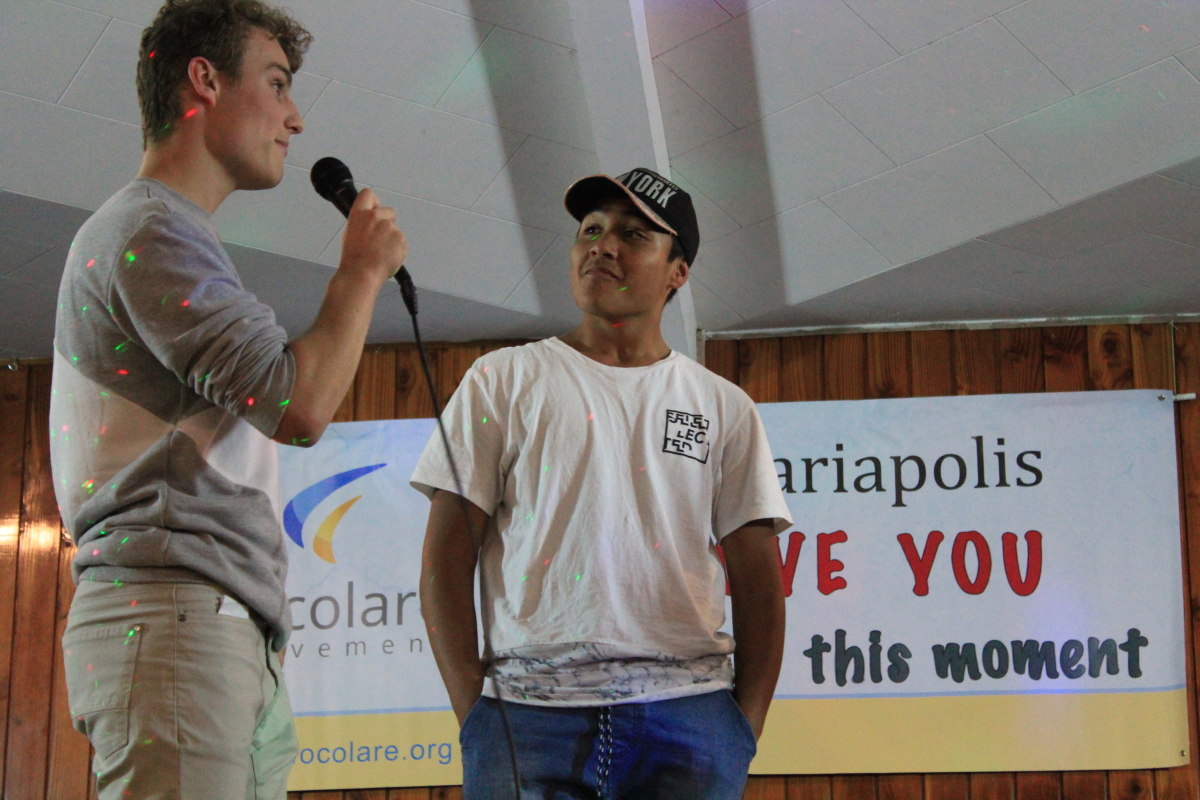 There were many experiences on the living the Gospel, a workshop on ecology, a much felt theme here, and one on the art of loving, some reflections of Chiara Lubich, and also on communication in the family and the education of children, not to mention the enchanting walks along the lake and in the forest.” It’s no wonder the North Island was chosen as one of the locations to shoot various scenes of Tolkien’s fantasy trilogy “The Lord of the Rings”. But the territory is particularly interesting also from an ethnological point of view. In fact the Island is inhabited by the biggest Maori communities of New Zealand. Up to 40 years ago the Maori language was spoken by a small number of people, but thanks to an integration program initiated by the government, today the culture and language of the Maori (about 20% of the population) have become an integral part of the nation. “During Mass,” Roberta and Stefano explained, “we recited some prayers in Maori, a people whose civilization and culture are well integrated.” After dinner, the Mariapolis included an evening program animated by children and young people which focused on an an interesting ecological theme regarding respect for creation and the environment.
There were many experiences on the living the Gospel, a workshop on ecology, a much felt theme here, and one on the art of loving, some reflections of Chiara Lubich, and also on communication in the family and the education of children, not to mention the enchanting walks along the lake and in the forest.” It’s no wonder the North Island was chosen as one of the locations to shoot various scenes of Tolkien’s fantasy trilogy “The Lord of the Rings”. But the territory is particularly interesting also from an ethnological point of view. In fact the Island is inhabited by the biggest Maori communities of New Zealand. Up to 40 years ago the Maori language was spoken by a small number of people, but thanks to an integration program initiated by the government, today the culture and language of the Maori (about 20% of the population) have become an integral part of the nation. “During Mass,” Roberta and Stefano explained, “we recited some prayers in Maori, a people whose civilization and culture are well integrated.” After dinner, the Mariapolis included an evening program animated by children and young people which focused on an an interesting ecological theme regarding respect for creation and the environment. 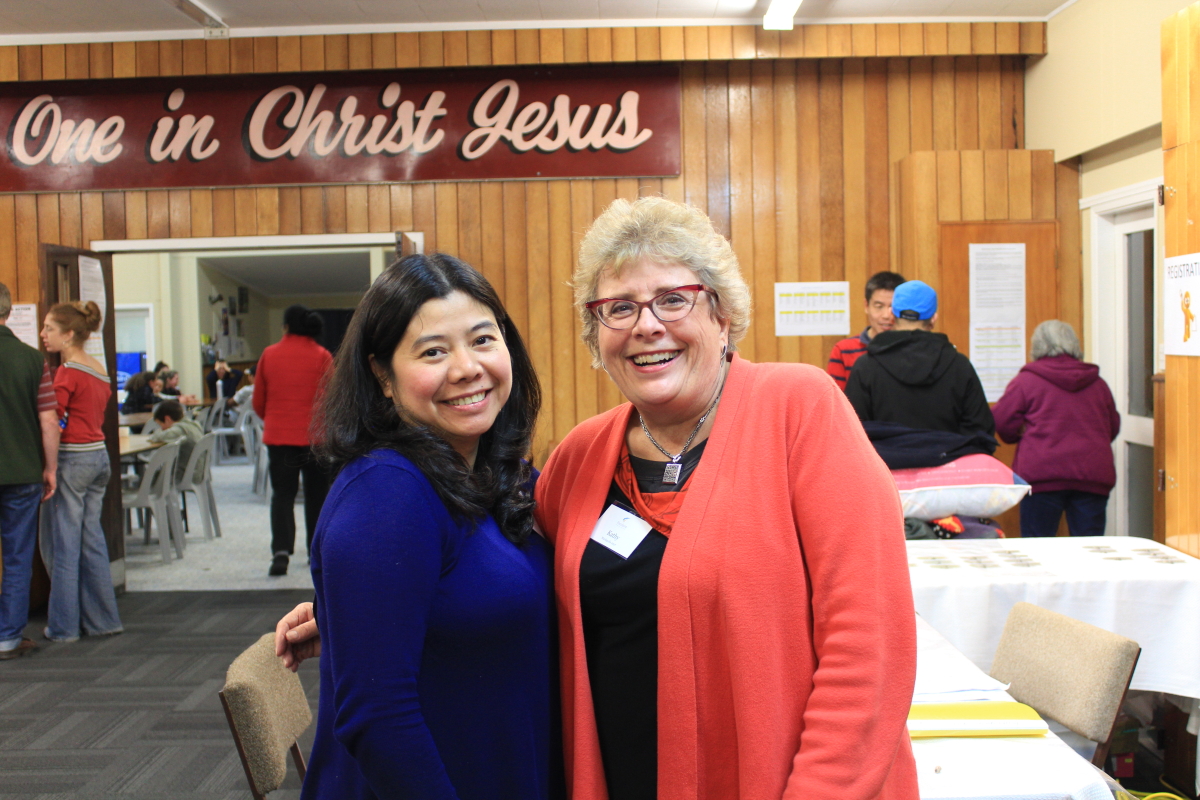 As in the simplicity of life in a big family, also in the Mariapolis everything was shared, like birthday celebrations and a wedding anniversary. “They were three very special days spent getting to know each other through personal chats, sharing joys and sufferings together, facing the challenges through the support of the community, and remaining faithful to the Gospel with coherence and constancy.” From here the “Mariapolis people” departed to return to their various places of origin, taking with them the energy and warmth of Rotorua.
As in the simplicity of life in a big family, also in the Mariapolis everything was shared, like birthday celebrations and a wedding anniversary. “They were three very special days spent getting to know each other through personal chats, sharing joys and sufferings together, facing the challenges through the support of the community, and remaining faithful to the Gospel with coherence and constancy.” From here the “Mariapolis people” departed to return to their various places of origin, taking with them the energy and warmth of Rotorua.
30 May 2017 | Focolare Worldwide
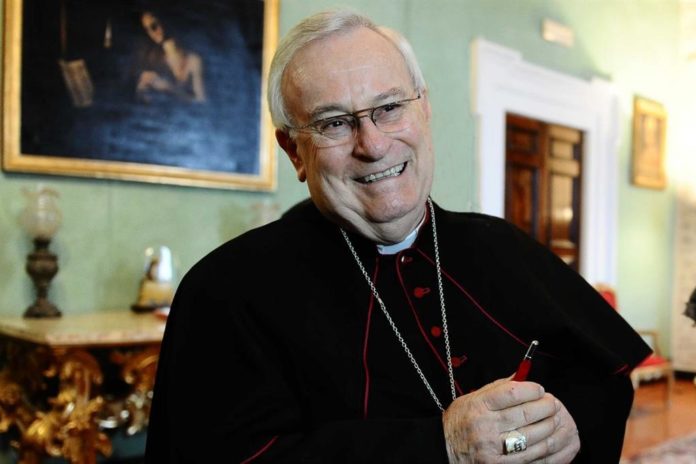
25 May 2017 | Focolare Worldwide, Senza categoria
 Maria Voce says that it was “with great pleasure” that she learnt of Cardinal Gualtiero Bassetti’s appointment as new President of the Italian Episcopal Conference (CEI) on May 24, 2017. In a letter congratulating him, the President of the Focolare Movement expresses her “most sincere wishes for this prestigious assignment, a clear sign of trust on behalf of the Holy Father.” “His sense of collegiality and love, which are his trademarks,” continues the President, “will be a great gift for the entire ecclesial and civil community of Italy, especially for those who most resemble Jesus Crucified and Abandoned “. The Focolare Movement in Italy also congratulated the new President of the Bishops’ Conference, saying his appointment is “a source of great joy”. In a press release, it emphasizes his “particular style in always being close to the people, to workers, migrants, families, in their situations of crisis and in their search for truth.” The Movement wishes that he may “experience in this new task an ever-renewed courage to face the countless challenges, comforted by the collegiality which is a witness to the fraternal aspect of the Church.” Born in 1942 in Marradi near Florence, Gualtiero Bassetti was ordained a priest in 1966. In 1994 he was appointed Bishop of Massa Marittima, then Bishop of Arezzo (1998) and in 2009 Archbishop of Perugia. In 2014, Pope Francis welcomed him into the College of Cardinals.
Maria Voce says that it was “with great pleasure” that she learnt of Cardinal Gualtiero Bassetti’s appointment as new President of the Italian Episcopal Conference (CEI) on May 24, 2017. In a letter congratulating him, the President of the Focolare Movement expresses her “most sincere wishes for this prestigious assignment, a clear sign of trust on behalf of the Holy Father.” “His sense of collegiality and love, which are his trademarks,” continues the President, “will be a great gift for the entire ecclesial and civil community of Italy, especially for those who most resemble Jesus Crucified and Abandoned “. The Focolare Movement in Italy also congratulated the new President of the Bishops’ Conference, saying his appointment is “a source of great joy”. In a press release, it emphasizes his “particular style in always being close to the people, to workers, migrants, families, in their situations of crisis and in their search for truth.” The Movement wishes that he may “experience in this new task an ever-renewed courage to face the countless challenges, comforted by the collegiality which is a witness to the fraternal aspect of the Church.” Born in 1942 in Marradi near Florence, Gualtiero Bassetti was ordained a priest in 1966. In 1994 he was appointed Bishop of Massa Marittima, then Bishop of Arezzo (1998) and in 2009 Archbishop of Perugia. In 2014, Pope Francis welcomed him into the College of Cardinals.
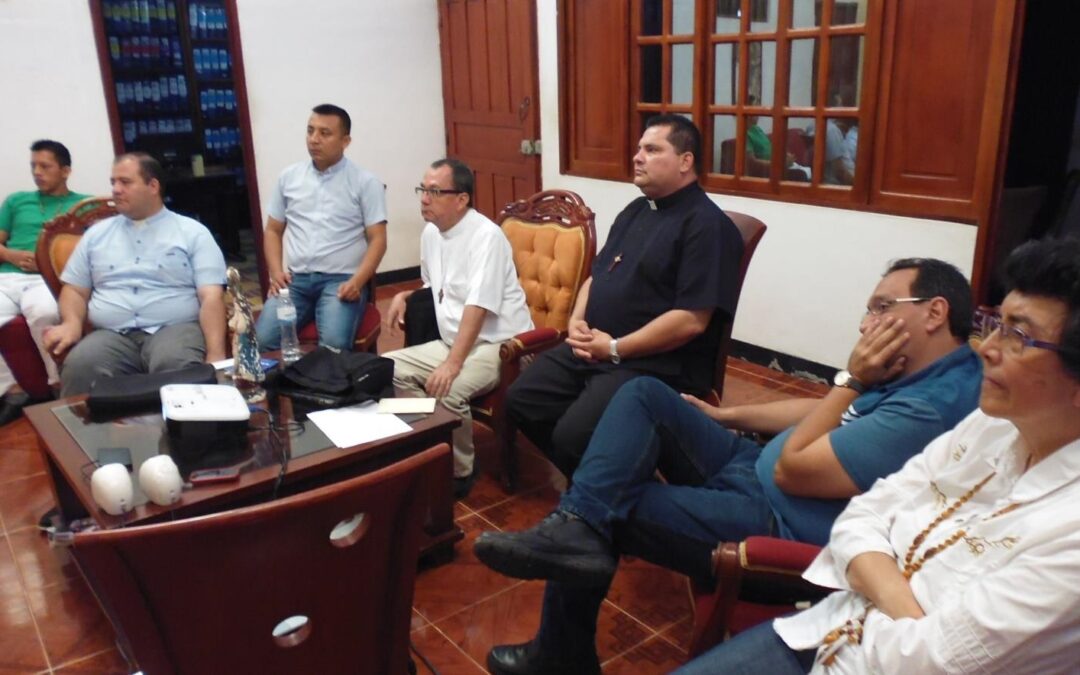
25 May 2017 | Focolare Worldwide
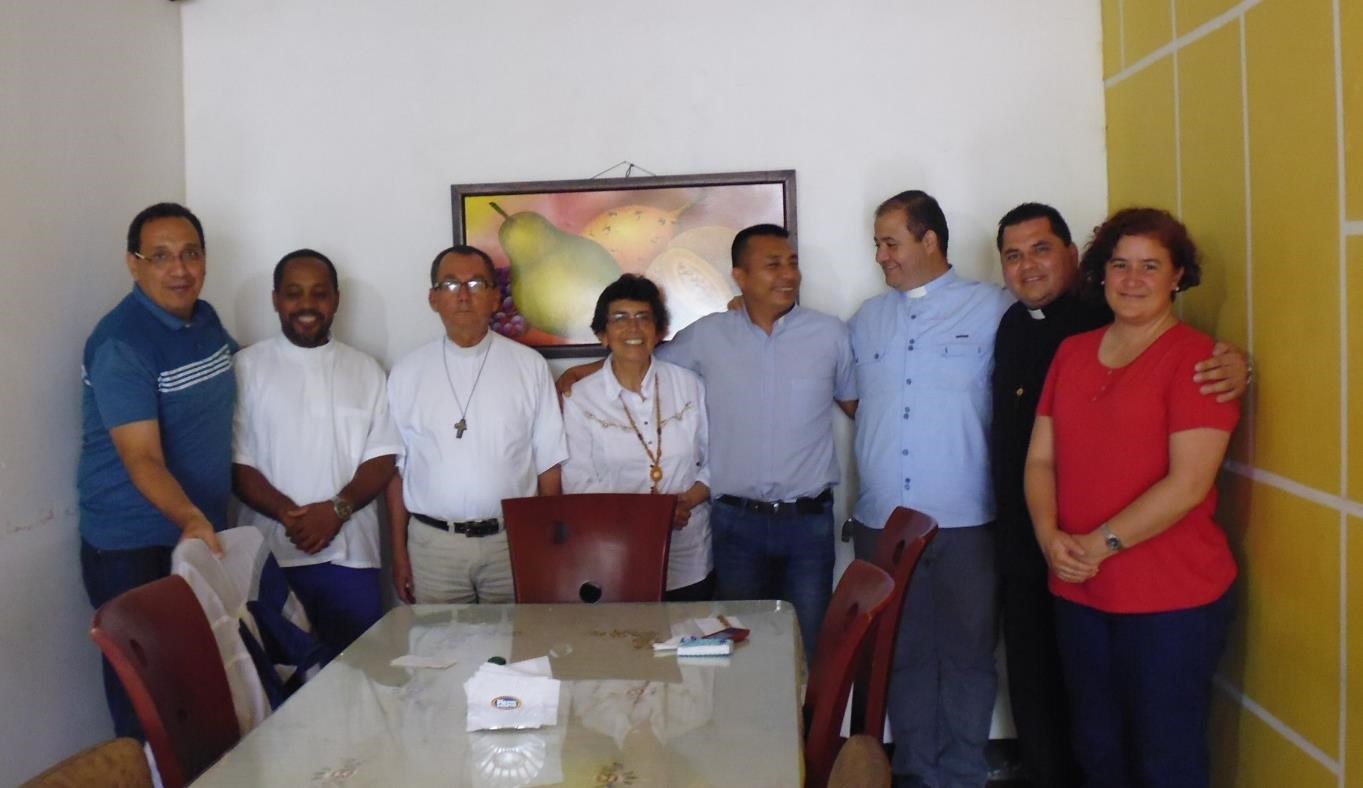 Elizabeth and Allejandra from the women’s focolare in Bogota write: “We went to Mocoa with Fr Juan Carlos Almario, a priest and a focolarino, to take monies to them that had been collected by the Focolare community of Colombia. We were there in the name of the entire Focolare family, to take them their love, prayers and concrete assistance, not only from the community in Colombia but also from many parts of the world that had become involved in this tragedy.” “Several priests from the Movement – pastors from Mocoa – welcomed us with much joy. Then we met the people. Every one of them had a painful story to tell us that was linked to the catastrophe, and we wept with them.” They recalled that April 1st night, the mudslides and the “love race” that broke out among them in reaching the victims. The priests and their bishop, Luis Maldonado, along with other parish priests, got organized to stand by the wounded in the hospitals, to welcome families in search of loved ones and to bury their dead… Then, with the help of other parishioners they set up a canteen to provide meals for people who were without water and electricity, and to share with the public workers that were involved in the relief effort. They arranged the assistance materials as they arrived, so that they could be distributed to those in need, along with surgical masks to protect from the overpowering odours. “The recount of their efforts had a strong Marian quality, silent but concrete, that reached the people through them and met many of the needs that resulted from the tragedy.”
Elizabeth and Allejandra from the women’s focolare in Bogota write: “We went to Mocoa with Fr Juan Carlos Almario, a priest and a focolarino, to take monies to them that had been collected by the Focolare community of Colombia. We were there in the name of the entire Focolare family, to take them their love, prayers and concrete assistance, not only from the community in Colombia but also from many parts of the world that had become involved in this tragedy.” “Several priests from the Movement – pastors from Mocoa – welcomed us with much joy. Then we met the people. Every one of them had a painful story to tell us that was linked to the catastrophe, and we wept with them.” They recalled that April 1st night, the mudslides and the “love race” that broke out among them in reaching the victims. The priests and their bishop, Luis Maldonado, along with other parish priests, got organized to stand by the wounded in the hospitals, to welcome families in search of loved ones and to bury their dead… Then, with the help of other parishioners they set up a canteen to provide meals for people who were without water and electricity, and to share with the public workers that were involved in the relief effort. They arranged the assistance materials as they arrived, so that they could be distributed to those in need, along with surgical masks to protect from the overpowering odours. “The recount of their efforts had a strong Marian quality, silent but concrete, that reached the people through them and met many of the needs that resulted from the tragedy.” 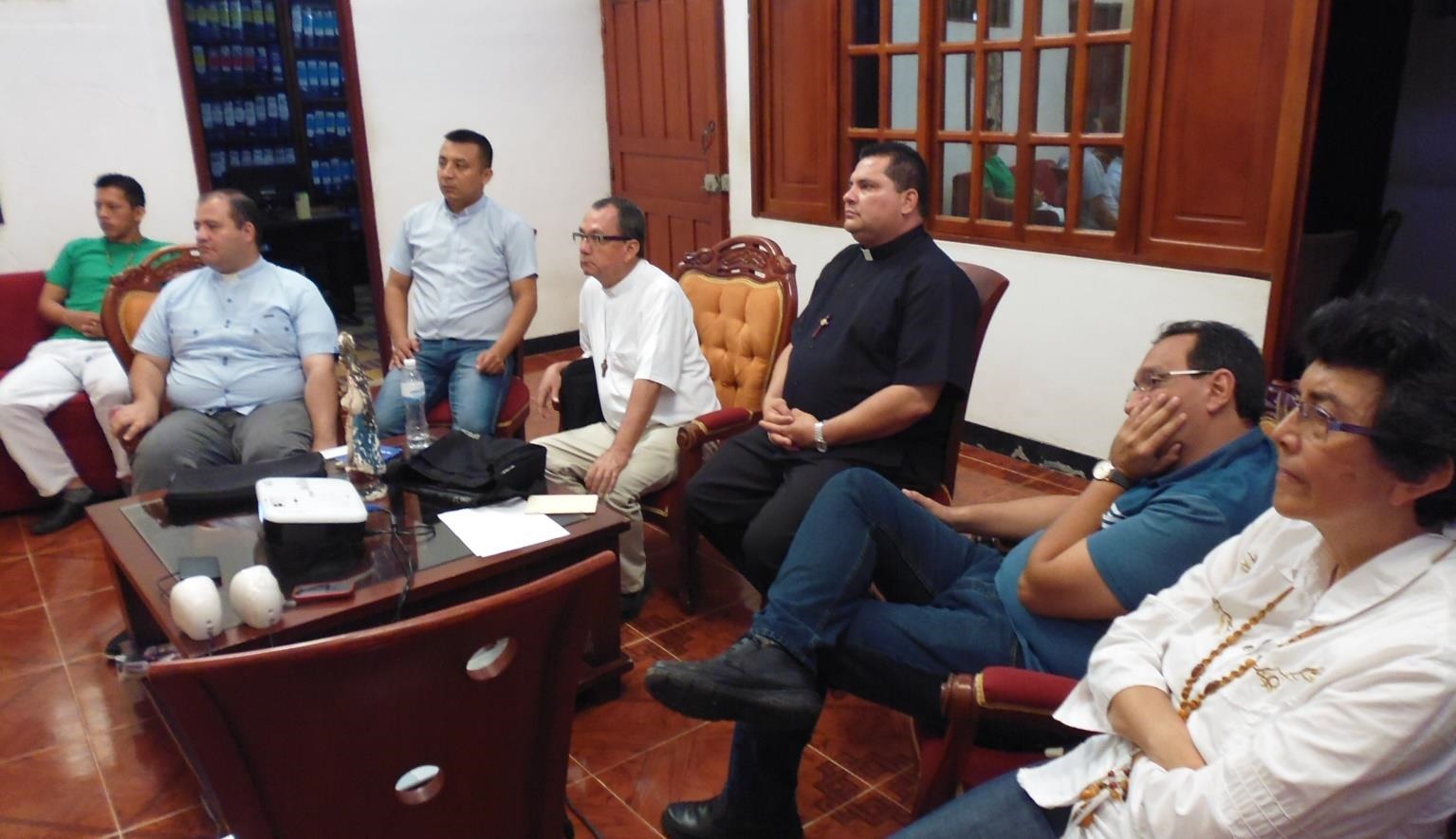 “We wanted to keep in our hearts the topic that the entire Movement is focusing on this year, and it seemed so in tune with the situation we found ourselves in: Jesus Forsaken.” In the spontaneous communion that was born, each one of us sought to see the suffering that was being experienced, seeing in it a face of the infinite suffering Jesus experienced on the Cross, which gives meaning to so much suffering.” One of the priests said, during lunch, that those hours spent with each other were like an “oases” that managed to detach him from the nightmare. “Then, together with Fr Oscar, we travelled around the places that were hit by the mudslides, some quarters completely wiped out. Others had been turned into cemeteries with houses demolished by huge boulders, with uprooted trees everywhere. The love, prayers and assistance reached all the way to Mocoa as it goes through this living hell, and it helped to uplift the victims of this tragedy somewhat. The trip also included a visit to the city of Neiva in southern Colombia: “We wanted to visit our local Focolare community and, with them, to prepare for the upcoming Mariapolis that will be held in July at an archaeological park where there are intact remains of some of the most ancient indigenous cultures.” Amidst the pain and suffering of natural distaster, the Focolare in Colombia is focused on the future. See also:News from Colombia
“We wanted to keep in our hearts the topic that the entire Movement is focusing on this year, and it seemed so in tune with the situation we found ourselves in: Jesus Forsaken.” In the spontaneous communion that was born, each one of us sought to see the suffering that was being experienced, seeing in it a face of the infinite suffering Jesus experienced on the Cross, which gives meaning to so much suffering.” One of the priests said, during lunch, that those hours spent with each other were like an “oases” that managed to detach him from the nightmare. “Then, together with Fr Oscar, we travelled around the places that were hit by the mudslides, some quarters completely wiped out. Others had been turned into cemeteries with houses demolished by huge boulders, with uprooted trees everywhere. The love, prayers and assistance reached all the way to Mocoa as it goes through this living hell, and it helped to uplift the victims of this tragedy somewhat. The trip also included a visit to the city of Neiva in southern Colombia: “We wanted to visit our local Focolare community and, with them, to prepare for the upcoming Mariapolis that will be held in July at an archaeological park where there are intact remains of some of the most ancient indigenous cultures.” Amidst the pain and suffering of natural distaster, the Focolare in Colombia is focused on the future. See also:News from Colombia
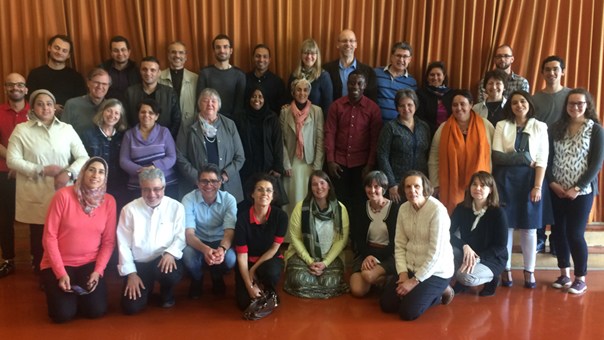
24 May 2017 | Focolare Worldwide
 «What lies in our heart? Towards what is it oriented? How can we learn to know it better? Aren’t the paths of the heart like roller coasters?» These are some of the issues which stimulated the dialogue between Christians and Muslims participating in a meeting and were visible signs of the desire of both groups to share. The meeting was held at the Muslim cultural center at the end of April and ended in the evangelic parish. It started with the theological reflections of the evangelical pastor, Martin Hoegger, and the Imam, Djalel Meskaldji. Both considered how the Bible and the Koran amplify the meaning of the word “heart,” not only as the seat of sentiments, but rather as the center of our being, and that space where we find dialogue with our own selves, with the others and with God. «The most common disease is not the flu, but schlerosis, that is, the hardening of the heart», M. Hoegger ironically said. And Djalel Meskaldji added: «According to the Koran, the heart can be even harder than stones. It is covered with rust.» They underlined in fact, that the heart is the most precious thing we have, but experience tells us that often it can harden. This leads to the consideration that the “custody of the heart” is a frequent theme in the Bible and in the Fathers of the Church, theologians of the first centuries. And so, to keep a strong hold on one’s heart is a real “spiritual battle.” This would be, according to Meskaldji, the real meaning of the word “Jihad,” according to Muslim tradition. Pastor Hoegger recalled that the biblical prophets «announced that God will one day chisel his law of love in our hearts and put in us a new heart, a heart of flesh.» Furthermore: «Christians turn to Jesus in whom this promise was fulfilled.» On his part, the Imam stressed that: «the Koran repeatedly affirms that the heart needs to be purified by the limpid water of the word of God. It wakens my heart, nurtures it, breaks its toughness and cleans it of the rust that is mostly the outcome of pride.» From Algiers, in live streaming Sheherazad and Farouk, Muslims, recounted how the discovery of God who is love, through the spirituality of the Focolare Movement, has revolutionised their lives as a couple: «We have learned how to love the other for himself, and let God act in the heart of each one so as to be a living witness of the unity of God. But above all, we experience God’s grace which encloses our heart with his mercy.» Then, Anne Catherine Reymond and Fabien, Christians of the Sant’Egidio Community, shared their pathway, narrating how the presence of God has transformed their hearts through prayer and fraternal life, and also through their contact with the poor. «Faith in God is a compass in the challenges which a couple has to face, especially in the education of their children. They push us to place ourselves on a second plane so as to put God in the first place.» What came to light in the group dialogues was what Christians and Muslims have in common. A Muslim woman from Lyon concluded: «In an era in which many try to divide our communities, it is very important to gather together in an atmosphere of mutual esteem!» In this joyful day the participants unanimously expressed the desire to continue the dialogue, also through new encounters.
«What lies in our heart? Towards what is it oriented? How can we learn to know it better? Aren’t the paths of the heart like roller coasters?» These are some of the issues which stimulated the dialogue between Christians and Muslims participating in a meeting and were visible signs of the desire of both groups to share. The meeting was held at the Muslim cultural center at the end of April and ended in the evangelic parish. It started with the theological reflections of the evangelical pastor, Martin Hoegger, and the Imam, Djalel Meskaldji. Both considered how the Bible and the Koran amplify the meaning of the word “heart,” not only as the seat of sentiments, but rather as the center of our being, and that space where we find dialogue with our own selves, with the others and with God. «The most common disease is not the flu, but schlerosis, that is, the hardening of the heart», M. Hoegger ironically said. And Djalel Meskaldji added: «According to the Koran, the heart can be even harder than stones. It is covered with rust.» They underlined in fact, that the heart is the most precious thing we have, but experience tells us that often it can harden. This leads to the consideration that the “custody of the heart” is a frequent theme in the Bible and in the Fathers of the Church, theologians of the first centuries. And so, to keep a strong hold on one’s heart is a real “spiritual battle.” This would be, according to Meskaldji, the real meaning of the word “Jihad,” according to Muslim tradition. Pastor Hoegger recalled that the biblical prophets «announced that God will one day chisel his law of love in our hearts and put in us a new heart, a heart of flesh.» Furthermore: «Christians turn to Jesus in whom this promise was fulfilled.» On his part, the Imam stressed that: «the Koran repeatedly affirms that the heart needs to be purified by the limpid water of the word of God. It wakens my heart, nurtures it, breaks its toughness and cleans it of the rust that is mostly the outcome of pride.» From Algiers, in live streaming Sheherazad and Farouk, Muslims, recounted how the discovery of God who is love, through the spirituality of the Focolare Movement, has revolutionised their lives as a couple: «We have learned how to love the other for himself, and let God act in the heart of each one so as to be a living witness of the unity of God. But above all, we experience God’s grace which encloses our heart with his mercy.» Then, Anne Catherine Reymond and Fabien, Christians of the Sant’Egidio Community, shared their pathway, narrating how the presence of God has transformed their hearts through prayer and fraternal life, and also through their contact with the poor. «Faith in God is a compass in the challenges which a couple has to face, especially in the education of their children. They push us to place ourselves on a second plane so as to put God in the first place.» What came to light in the group dialogues was what Christians and Muslims have in common. A Muslim woman from Lyon concluded: «In an era in which many try to divide our communities, it is very important to gather together in an atmosphere of mutual esteem!» In this joyful day the participants unanimously expressed the desire to continue the dialogue, also through new encounters.










